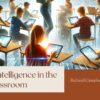Ever felt like traditional vocabulary learning methods were a bit, well, yawn-inducing? Let’s shake things up! AR, or augmented reality, is here to turn vocabulary building into a thrilling adventure, right from the comfort of your living room. Gone are the days of monotonous flashcards.
With AR, words come alive in a way that’s not just effective but also a whole lot of fun. In this post, we’ll explore how AR can jazz up learning and help words stick for good!
“Beyond Boring Flashcards: The Real-Deal Benefits of AR for Vocabulary Building”
Remember those days of just staring at flashcards, trying to memorize word after word? Traditional ways of learning vocabulary can feel like a never-ending race, leaving kids (and, let’s be honest, us adults too) feeling pretty zapped and disconnected. But here’s the good news: AR, or augmented reality, is changing the game in a big way.

Think of AR as a burst of sunshine on a cloudy day. It transforms the old-school memorization grind into an exhilarating, interactive journey. And the perks? They’re as real as it gets.
Boosting Engagement
Say goodbye to just sitting back and trying to soak up words. With AR, kids become part of the action. They’re not just learning; they’re exploring a virtual world of words.
Imagine them catching butterflies with Spanish words fluttering on their wings or roaring like a T-Rex while picking up dinosaur terms. Learning suddenly shifts from a chore to an enthralling game, with each new word unlocking a level of fun.
Improving Memory
The struggle to remember words long after the flashcards are gone? That’s history with AR. Its immersive experiences create strong connections between the word and its real-world use.
Picture this: visualizing the Great Wall of China while learning Mandarin or building a virtual solar system during science class. These lively, interactive sessions help make sure those tough words stick around.

Sparking Curiosity
Learning isn’t just about stuffing facts into our brains. It’s about lighting up a love for discovery. AR does just that. It opens doors to worlds of exploration and imaginative play.
Kids can travel back in time, meet historical figures, or dissect virtual frogs, all in 3D. This kind of excitement fuels a genuine eagerness to learn more words and concepts.
Building Skills for the Future
Learning new words is more than expanding vocabulary; it’s about preparing for tomorrow. AR brings together learning words with developing key 21st-century skills like critical thinking, collaboration, and problem-solving. Imagine students teaming up to solve AR puzzles using vocabulary clues or creating interactive presentations.
AR not only boosts vocabulary but also hones communication and creative thinking, all while having a blast.

So, forget the old flashcard routine. Step into the vivid, vibrant world of AR for vocabulary building, where learning feels like playing, and each new word is a step into an exciting future!”
Bringing AR for Vocabulary Building Home: Fun for All Ages
No need for a high-tech classroom to get started with AR for vocabulary building. It’s all about bringing this fantastic learning tool right into your home and making it work for everyone, no matter their age or budget.
Let’s jump into how you can make this happen, whether you’re a parent, a teacher, or just someone curious about the magic of AR.
Preschoolers: AR Playmates
For the littlest learners, AR is like a box of wonders. Picture their eyes lighting up as coloring pages turn into talking animals and singing objects. Apps like Quiver Edu and ColorBlast AR bring drawings to life, introducing new words in the most playful way imaginable.
Elementary School: Interactive Learning
Moving beyond the snoozefest of old flashcards, AR brings learning to life. Apps like AR Flashcards turn vocabulary lessons into a game. Kids can go on a dinosaur hunt or a space exploration, picking up new words as they play.

Middle School: Immersive Experiences
Middle schoolers crave something that really grips their imagination. AR answers this call by transporting them to different times and places.
They can step back into history, meet famous figures, or explore virtual labs, all while picking up vocabulary related to their lessons.
High School: Creative and Tech-Savvy Learning
For teens, AR is a launchpad for creativity. They can create AR presentations on environmental issues, design virtual field trips, and more. These activities not only deepen their understanding but also sharpen skills like communication and problem-solving.

But hey, don’t worry about the cost. There are tons of free and budget-friendly AR apps out there. Resources like ClassVR and EDUVERSE offer educational AR experiences for free. Plus, libraries and community centers often have technology workshops where you can get access to AR tools.
So, what’s stopping you? Grab your phone or tablet, pick an AR adventure, and watch as a world of words unfolds in your living room or classroom. AR for vocabulary building isn’t just effective; it’s an adventure that awaits at your fingertips.
Easing Worries: Making AR for Vocabulary Building a Breeze
Got some jitters about jumping into AR for vocabulary building? It’s totally normal to have a few butterflies when embracing new tech. Let’s tackle those concerns head-on and show you how easy and hassle-free it can be to bring AR into your learning adventures.
Device Accessibility
Worried you need some high-tech gear? No way! Most AR apps are perfectly happy on your everyday smartphone or tablet.
These devices are like magic wands, turning ordinary screens into windows of wonder. With apps like Seek by iNaturalist and Jurassic World Alive, your regular phone or tablet is your ticket to amazing AR experiences.

Budget-Friendly Options
Thinking AR sounds pricey? Think again! There’s a treasure trove of free or low-cost AR apps out there. Resources like ClassVR and EDUVERSE offer fantastic educational experiences without costing a dime. And don’t forget, local libraries and community centers often have tech workshops with free access to AR tools.
Balancing Screen Time
Screen time is like candy—a little is great, but too much can be an issue. It’s all about balance. For younger kids, mix short AR sessions with plenty of outdoor play. For older kids, AR projects can be a cool way to learn while actively engaging with technology.
And hey, always keep the chat open about responsible tech use. It’s key to making AR a valuable part of your learning toolkit, not just another screen time.

So, take a deep breath, and let’s ease those worries. AR for vocabulary building is accessible, affordable, and a fantastic way to spice up learning. Just set some healthy screen time boundaries, pick the right apps, and you’re all set for a fun, educational adventure. Ready to dive in?”
Wrapping It Up: The Exciting World of AR for Vocabulary Building
Alright, let’s wrap this up! It’s time to say goodbye to those old, dull flashcards and hello to the electrifying world of AR for vocabulary building. Just imagine the possibilities!
Dinosaurs marching right through your living room, planets hovering in your backyard, and historical figures stepping right out of textbooks—all these while boosting vocabulary in a way that’s truly unforgettable.
Whether it’s for curious preschoolers or tech-savvy teens, AR has something incredible for everyone. And don’t sweat the tech or budget stuff—plenty of free apps and resources make AR a breeze for any phone or tablet. Concerned about screen time? No worries; just set some smart guidelines and mix it up with real-world adventures.
So, are you pumped to dive into the AR revolution? Start by downloading a free app, giving it a whirl, and watching the magic unfold. Share your adventures with others online, swap stories with fellow parents and educators, and see your little learners embark on vocabulary journeys that they’ll always remember.
Remember, learning’s not just about cramming words into our heads. It’s about sparking a lifelong love for knowledge. AR is just the tool to light that fire. Don’t wait around; explore your app store, open up a world of endless vocabulary opportunities, and kick-start an exciting AR journey. Who knows what incredible words and worlds you’ll discover?









Recent Comments